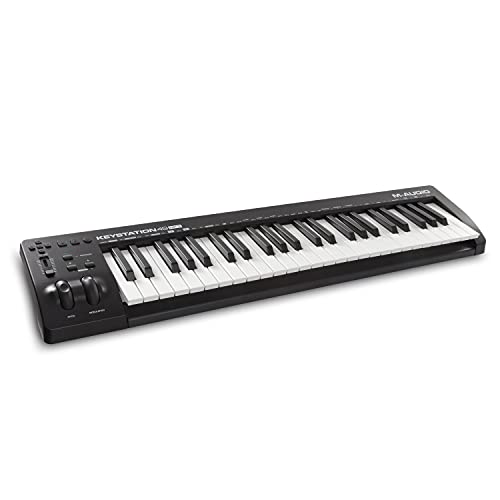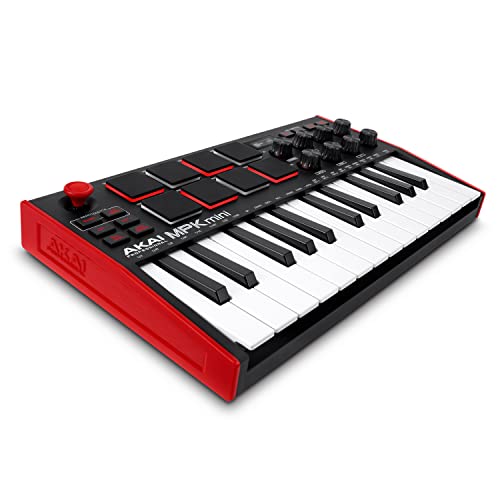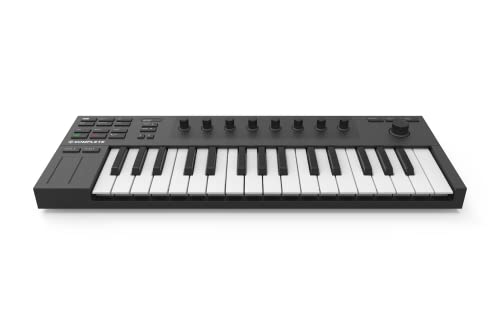The amount of MIDI keyboard options in the market has significantly increased in recent years due to a rapidly growing interest in home music production.
Whether you are a hobbyist or a professional musician and producer, there are tons of affordable MIDI keyboards to choose from.
If you’re seeking high-quality MIDI keyboards at an affordable price, then look no further.
In this MIDI keyboard buying guide, we’ve rounded up a list of the best budget MIDI keyboards in 2024 along with their features, pros and cons, and pricing.
This article will also provide a comprehensive overview and share expert insights into the following topics:
- Best budget MIDI keyboards in 2024
- How to choose the ideal MIDI keyboard.
Let’s get started!
What is a MIDI Keyboard?
MIDI stands for Musical Instrument Digital Interface, which is a protocol that enables musical instruments to communicate with a digital audio workstation (DAW) or the music editing software on a computer when playing or recording electronic music.
It was developed in the early 80s as a way for manufacturers to make music hardware compatible with different brands. MIDI keyboards are essentially MIDI controllers that are designed to mimic the structure of a piano.
They have been a staple for beginners and professionals alike because of their versatility and iconic role in music production throughout the past decades.
The transfer of MIDI data could initially only occur via MIDI ports that require a special MIDI cable. In this day and age, it occurs with the use of USB ports.
Top 7 Budget MIDI Keyboards in 2024
The criteria we used to gather our list are focused on quality, value for money, features, and usability for various needs. Let’s dive into the top MIDI keyboards for beginners and experts in 2024:
M-Audio Keystation 49 MK3 (Our Top Pick)
 Check Price on Amazon
Check Price on Amazon
- Price: $100 – $150
- Key Specs: 49 full-size and velocity-sensitive keys, USB and MIDI connection, compatible with PC, Mac, and iOS devices
Our number one pick as the ultimate budget MIDI keyboard in 2024 is the M-Audio Keystation 49 MK3!
You just can’t beat how tailor-made it is for both beginners and seasoned musicians. It is a one-size-fits-all MIDI keyboard that boasts a minimalist design with an emphasis on functionality.
The M-Audio Keystation 49 MK3 is one of the most versatile MIDI keyboard controllers with keys that capture every subtle nuance of your performance. It provides musicians with the ultimate expressive way to create music.
If you’re looking for a durable MIDI keyboard to take your music production to the next level, the M-Audio Keystation 49 MK3 is your best bet.
Pros
- USB-powered
- Plug-and-play connectivity
- Intuitive control
Cons
- No aftertouch
- No onboard sounds
- Limited controls
Novation FLkey 37
 Check Price on Amazon
Check Price on Amazon
- Price: $199.99 – $109.99
- Key Specs: Step sequencer, integration with FL Studio, chord mode, scale mode, instrument control via pads, compatible with PC and Mac
The Novation FLkey 37 is an incredible tool for aspiring producers with limited music theory knowledge because it is equipped with features such as chord fix mode.
You can essentially play chords for beats without even knowing how to play chords.
We love the design direction that Novation took for this MIDI keyboard! It has a hardware synthesizer style that is boxy, everything is where it needs to be, and it does not feel cheap like other MIDI keyboards on the market.
The layout is straightforward and the keyboard significantly enhances your workflow once you get the hang of it.
Pros
- Clear control layout
- Immediate access to important FL Studio functions
- High-quality and useful pads
Cons
- Not ideal for multiple DAWs
- Takes some effort to master the functionality of its features
Arturia MiniLab 3
 Check Price on Amazon
Check Price on Amazon
- Price: $109
- Key Specs: Hi-res display, DAW control mode, custom controller mappings, two-octave velocity-sensitive slim-key keyboard, full suite of software
The MiniLab 3 is the latest version of Artutia’s 25-mini key MIDI controller keyboard. It has the same weight and footprint as the MkII but has an overall slicker look and is available in white and black.
That’s not to mention that it’s also made with 50% recycled plastic and comes with a 5-year guarantee!
The Arturia MiniLab 3 has an impressive build quality that integrates well with your software. It has two factory modes (Arturia and DAW) along with five user configuration memory modes and can support Mackie Control protocol.
For new users, the Arturia MiniLab 3 is one of the best options that offers excellent value and an incredible software bundle.
Pros
- Compact, portable, and stylish
- High-quality faders and rotaries
- Responsive pads and keys
Cons
- No configuration app available for iOS or Android
- Not really worth an upgrade if you already have a MiniLab MkII
Novation Launchkey 49 MK3
 Check Price on Amazon
Check Price on Amazon
- Price: $199.99 – $259.99
- Key Specs: Ableton Live integration, generative arpeggiator, scale mode, chord modes, extensive software package
The Launchkey MK3 is the third iteration of Novation’s Launchkey keyboard controllers.
Straight out of the box, it feels substantial and built to last with the black keys having the same matte finish as the keyboard body being a very nice touch.
A remarkable addition to the Novation Launchkey 49 MK3 is the incredibly useful backlit LCD screen.
It is also fully equipped with brand-new chord, scale, and arpeggiator features. Overall, the product is small but it accurately displays all the information you need and all of the pads and buttons are solid and responsive.
Similar to its predecessors, the Launchkey 49 MK3 comes with a one-of-a-kind synchronicity with Ableton Live and is effortless to control.
Pros
- Stores four custom modes
- Arpeggiator mutate and deviate
- Great design
Cons
- Transport buttons do not light up
- No aftertouch
- No off button
AKAI MPK Mini MK3
 Check Price on Amazon
Check Price on Amazon
- Price: $119
- Key Specs: 25 velocity-sensitive keys with 10-octave range, eight continuous rotary knobs, two pad banks, sustain pedal input, USB-powered, comprehensive software bundle
The AKAI MPK Mini MK3 is one of the most popular MIDI keyboard options for both on-the-go users and beginners. Its controller knobs are now a continuous rotary design that includes relative and absolute options.
The keybed’s new Akai Dynamic Gen 2 design is mechanically quiet, solid, and responsive.
With the AKAI MPK Mini MK3, you no longer have to deal with values jumping when you switch plugins if your DAW can support relative controller assignments.
Last but not least, Akai has also made it a point to include around 2GB of drum and percussion samples across four different packs. These include LoFi Producer Collection, Soulful Drums, Producer Kits, and Trap Soul & LoFi Beats.
Pros
- Portability
- Built-in arpeggiator
- New OLED screen
- Improved keybed
Cons
- Does not come with MIDI Out
- Thumbstick can turn some people off
Arturia Keystep 37
 Check Price on Amazon
Check Price on Amazon
- Price: $83.40 – $199
- Key Specs: 37 slim keys with aftertouch, chord and strum functions, onboard arpeggiator with eight patterns, 64-step sequencer with eight user memories, control software for customization and data storage
The Arturia Keystep 37 is a handy mini keyboard controller with the ability to communicate fluidly with a wide range of gear.
It was simply a joy to use when we tested it in internal sync mode and trigger software instruments within Logic Pro. Pitch bend and modulation controls noticeably add to the overall positive experience.
Despite its small physical footprint, the Arturia Keystep 37 is a jam-packed MIDI keyboard controller that is a diverse creative tool. Whether you are looking to arpeggiate, sequence, or refine your musical ideas, the Keystep 37 will get the job done!
Pros
- Flexible chord mode
- Great mix of analog and digital interface
- Excellent sequencer and arp
Cons
- Pattern chaining is not passed down from the KeyStep Pro
NI Komplete Kontrol M32
 Check Price on Amazon
Check Price on Amazon
- Price: $129
- Key Specs: Micro-sized controller keyboard with 32 keys, TRS pedal input, USB-powered, pre-mapped control of Komplete instruments and effects, compatible with PC and Mac
While the NI Komplete Kontrol M32 lacks many of the Komplete Kontrol features such as touch strips and lights, it is a good option aimed towards beginners in music production.
Overall, it can be considered a perfect form factor for a mobile MIDI keyboard controller.
If you prefer having a slim profile and extra half-octave compared to the 25-key options, the NI Komplete Kontrol M32 is for you!
The product is a bit longer than an average mini keyboard and will require a fairly large bag to transport but it is completely worth it for so much portable production power.
Pros
- Touch-sensitive endless knobs
- Excellent size
- Great software and instrument package
Cons
- Minimal visual feedback
- Fixed MIDI template
- USB only
MIDI Keyboard Buying Tips
When it comes to purchasing the ideal MIDI keyboard, evaluating your top options will ultimately depend on your budget and the features you need.
Here are some of the most crucial factors to consider in making a future-proof investment with a MIDI keyboard:
Consider the number of keys you need
The number of keys you select will determine the size of your MIDI keyboard and its range. The common number of keys you can choose for a MIDI keyboard are 25, 32, 37, 49, 61, 88, and 91.
These digits relate to the number of octaves on a keyboard – for example, 49 keys will give you four octaves.
Check for compatibility with your software
The majority of MIDI keyboard controllers on the market today work with almost every DAW. However, the partnerships between software developers and hardware manufacturers also produce certain controllers that are only geared toward specific DAWs.
Therefore, the software that you are already using can play a big role in what you pick!
Look for additional features (pads, knobs, faders)
Extra MIDI controls such as knobs, faders, wheels, pads, touch strips, and buttons vary for each keyboard controller.
These features are some of the most important considerations in your purchase because they can significantly shape and improve your workflow.
Decide between weighted and non-weighted keys
MIDI keyboard keys are available in different weights. Fully-weighted keys emulate piano keys and provide some resistance. They feel the most similar to a real piano, but are also the most expensive.
Semi-weighted keys offer some but not all of the features of weighted keys, while synth-action keys are the fastest option available in the group.
Check for portability and build quality
Lastly, make sure to also prioritize the build quality and portability of the MIDI keyboard!
These will ultimately determine its durability and how conveniently you can move it around depending on your purposes, whether you are using it to perform or otherwise.
Final Thoughts
When it comes to choosing a MIDI keyboard, there are plenty of budget-friendly options available on the market today. Each model differs in aspects such as performance, durability, price, usability, features, and control options.
Remember that the first and arguably most important step in selecting the best MIDI keyboard is to identify your needs.
To ensure that you make the most informed decision possible, you can refer to our guide above to narrow down your choices!
FAQs
What features are essential in a budget MIDI keyboard?
Some of the most essential features to consider when purchasing a budget MIDI keyboard include keyboard layout, key weight, MIDI mapping, and additional creative controls such as modulation and pitch wheels, knobs, pads, and buttons.
How do I decide between a 25-key, 49-key, or 61-key MIDI keyboard?
MIDI keyboards come in a wide variety of sizes and number of keys. If you want to use it as a piano, a MIDI keyboard with no less than 61 keys is the best choice. But if you are using it for leads and bass, 49 keys is more optimal.
Philip had the founding vision for Audio Assemble, previously known as Pro Tools Tutorial. In 2008 Philip began recording and producing songs and had a hard time finding free and accurate information on Pro Tools software. From there the website was born. Philip currently works as a Software Engineer for Amazon and handles the editorial strategy as well as much of the technical aspects of Audio Assemble’s website.